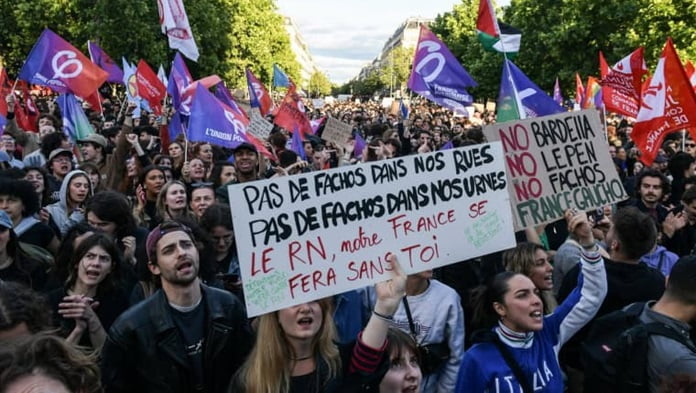Far-right political parties have enjoyed electoral success in the recent European Parliament elections, emerging on top in some countries while making electoral gains in others.
Despite these gains, they did not unseat the ruling centre-right European People’s Party. There is still time for the left to check the far-right’s rise before they gain enough power to destabilise the parliament.
The far right’s meteoric rise came as a shock to the left. In Germany, the far-right Alternative for Germany (AfD) achieved up to 25 per cent of the vote in some states, despite only capturing 16 per cent nationally.
In France, the far-right National Rally (RN) garnered about 37 per cent of the national vote, jumping from 23.3 per cent in 2019 and outperforming President Emmanuel Macron’s coalition. This crisis led him to call snap parliamentary elections to shore up support for his allies. This move is intended as a show of strength against fascism but failure would risk him losing control over France’s domestic policy as well.
Fascists and far-right parties also made significant gains across other European countries. In Austria, the far-right Freedom Party claimed 25.7 per cent of the vote, finishing ahead of the 24.7 per cent for the conservative People’s Party and 23.2 per cent for the Social Democrats.
Italian Prime Minister and fascist Giorgia Meloni and her party, the Brothers of Italy, polled 28.8 per cent of the vote compared to 25 per cent for the centre-left opposition. The far right also made gains in countries like Belgium, Spain and Estonia.
However, not all right-wing parties performed as well as expected. Viktor Orban’s populist Fidesz party in Hungary received only 44 per cent of the vote as of writing, 8 per cent lower than in 2019.
Some left-wing parties also performed relatively well. Réveiller Europe, a coalition between the French Socialist Party and the green left Place Publique, won 13.84 per cent of the vote while the Socialist People’s Party in Denmark came out on top with 17.4 per cent.
Rising inequality
The political crises facing Europe’s ruling parties show how people across the continent feel increasingly disillusioned with their governments.
In 2023, massive strikes broke out against Macron’s government over pension reforms that raised the retirement age from 62 to 64. In their aftermath, some workers have expressed their frustrations with the establishment by voting for the far right as an alternative to an ineffective status quo.
Capitalism creates the conditions that enable fascism’s rise. Corporations have exploited the working class in pursuit of ever-increasing amounts of profit, which has fuelled widespread wealth inequality, stagnant wages and the decline of the welfare state.
The World Bank’s 2024 Global Economic Prospects show that real GDP growth in the Eurozone since 2021 has slowed and even contracted a little. These factors have strengthened the far-right’s influence across Europe.
Most people are not voting for these parties because they are hardline racists. Many are ordinary people disgruntled with the status quo and the ruling government’s unwillingness to address their problems.
However, leaders of these racist parties are blaming the working class’s problems on scapegoats like migrants. The far-right has also succeeded in getting the centre-right Macron government to do its dirty work, like passing restrictive immigration laws that introduced migration quotas and made it harder for children of migrants and refugees to become French. These policies have opened the path towards normalising extremism among voters in France.
Fascism is opposed to workers’ interests. The horrors of the Second World War and the Holocaust underline how fascism is a dead end that brings war and destruction.
Human dust
This is a concerning moment for the left. If left unchecked, the risk is that fascist parties will consolidate their racist, Islamophobic politics.
But although many far-right parties have won relatively large portions of the vote, this result does not necessarily translate to strong support on the ground.
In his letters that addressed the spectre of Nazism in 1930s Germany, Marxist theorist Leon Trotsky called the mass of fascist supporters “human dust”. He meant that their strength was only individual and isolated, compared to the collective strength of a unified working class. There is still time for the left to find ways to harness this collective power to defeat European fascism.
Some anti-fascist and anti-racist groups have responded to this concerning rise by mobilising. Thousands of anti-racists in France joined with unionists at Place de la République in Paris to protest against the RN’s election gains. There is a high level of mobilisation with hundreds of such demonstrations happening across the country.
Various left-wing parties have formed a coalition called the New Popular Front to challenge the far-right in the upcoming snap parliamentary election.
While this coalition may help stop the far-right from gaining power in the upcoming election, at best it would be only a temporary reprieve. Electoral politics is ultimately incapable of defeating fascism.
The only way to beat this ideology is to destroy the conditions contributing to its existence: inequality, economic insecurity and exploitation.
British revolutionary Tony Cliff once said we must fight not just the rats but the sewers in which they multiply. This means a fight against capitalism and the whole system.
By Brendon Henry






